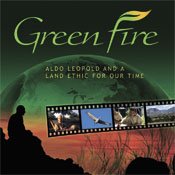Aldo Leopold believed in wildlife management and conservation long before it was fashionable. "Conservation is a state of harmony between men and land," he wrote in his well-known book, "A Sand County Almanac and Sketches Here and There," published shortly after his death by Oxford University Press in 1949. (Oxford reissued the book in paperback in 1989 and in an illustrated hardback in 2001; Ballentine issued a paperback in 1986). He believed in land ethics before global plundering. Leopold was a man ahead of his time, and his research, work and writings continue to guide environmentalists in the 21st century.
The gorgeous documentary "Green Fire" (2011) delves into Leopold's life, vision and insight. Through stunning high-definition photography and archival footage, the movie canvases Leopold's life and the development of his philosophy. It explores Leopold's boundaries of community to include "soils, waters, plants and animals, or collectively: the land."
Dr. Curt Meine, Leopold's biographer and a conservationist biologist, guides us though the cinematic journey. A partnership of the Aldo Leopold Foundation, the U.S. Forest Service and the Center for Humans and Nature produced the documentary.
In 1909, American forestry was in its infancy. Leopold, an Iowan by birth, belonged to a new and rugged group of people. He joined the U.S. Department of Forestry after college at Yale University. After putting together a dapper forest-ranger ensemble and finding the right horse for his duties, Leopold got to work.
His first assignment was to measure the Apache Forest, which was then part of the Arizona territory. At age 22 and only two weeks on the job, Leopold came to an epiphany in the wilderness: "We reached the old wolf in time to watch a fierce green fire dying in her eyes. I realized then, and have known ever since, that there was something new to me in those eyes—something known only to her and to the mountain. I was young then, and full of trigger-itch; I thought that because fewer wolves meant more deer, that no wolves would mean hunters' paradise. But after seeing the green fire die, I sensed that neither the wolf nor the mountain agreed with such a view."
The dying green fire in one wolf's eyes changed the impressionable Leopold. With his own eyes opened to the symbiotic relationship between man and wildlife, Leopold developed an ethic to guide future generations. "A land ethic, of course, cannot prevent the alteration, management and use of these 'resources,' but it does affirm their right to continued existence and, at least in spots, their continued existence in a natural state. In short, a land ethic changes the role of Homo sapiens from conqueror of the land-community to plain member and citizen of it. It implies respect for his fellow-members, and also respect for the community as such."
"Green Fire" is thoughtful and insightful. The film seamlessly blends spectacular landscapes, interviews with scientists, and up-close and personal revelations from Leopold's family members. It strikes the right blend between entertainment and insight.
See the Mississippi premiere of "Green Fire" Tuesday, March 6 at Millsaps College in the Ford Academic Complex Recital Hall at 7 p.m. Millsaps and the National Forests in Mississippi sponsor the screening, which is part of Millsaps' popular Arts and Lecture Series. Tickets for each program are $10. For more information, contact the Office of Continuing Education at 601-974-1130.



Comments
Use the comment form below to begin a discussion about this content.